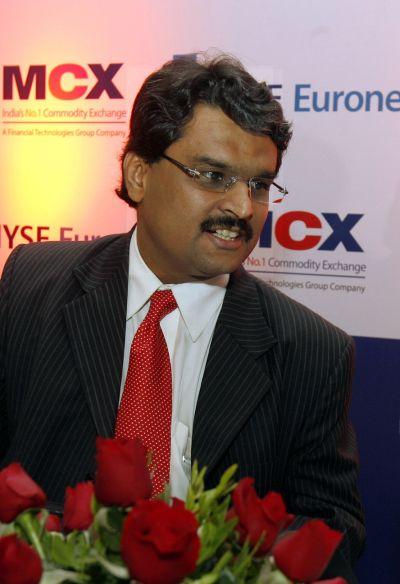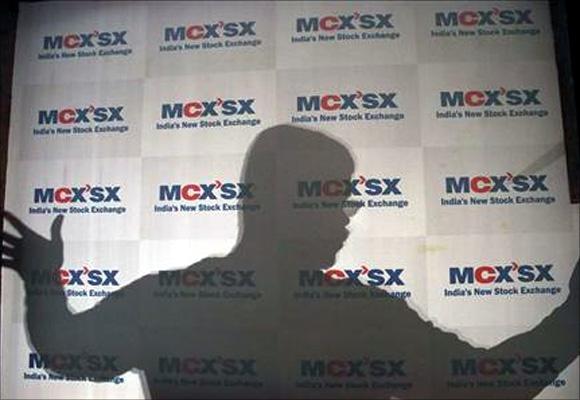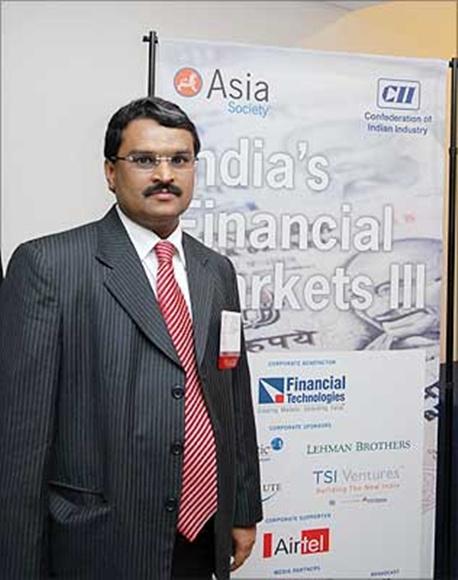Photographs: Jimmy vikas/Wikimedia Commons N Sundaresha Subramanian in Mumbai
Strong arm tactics have helped smother criticism of group's activities and did not allow even basic analysis or questions on the huge spurt in volume of the National Spot Exchange (NSEL) when others in the space were struggling.
K M Abraham saw it coming. The wholetime member of Securities and Exchange Board of India (Sebi) asked some pertinent questions in his order against the MCX Stock Exchange in September 2010.
In his order he dealt with the "fit and proper" criteria of the exchange promoted by Financial Technologies (FT) and Multi Commodity Exchange (MCX) and their founder Jignesh Shah.
Referring to the complicated structures such as buyback agreements and evolved by the group to comply with the Manner of Increasing and Maintaining Public Shareholding in Recognised Stock Exchanges (MIMPS) Regulations, the member had declined to give approval to the exchange for trading in the equities segment.
...
The men who predicted Jignesh Shah's downfall
Image: Jignesh ShahPhotographs: Punit Paranjpe/Reuters
On withholding information on buyback arrangements from Sebi, Abraham said, "Given the position of a stock exchange as a first-line regulator, I find this dishonesty on the part of the applicant serious."
Monday's Economic Times has reopened that debate of fitness and propriety when it said "Today, Shah has to give a commitment of another kind to salvage his reputation and remain "fit and proper" in the rule book of regulators.
Soon after the order, Abraham and his colleague M S Sahoo, also a wholetime member of Sebi, became the target of a campaign that accused them of batting for the rival National Stock Exchange (NSE).
Some personal details of flats purchased in a building that NSE had connections with were published in the media. Though these allegations did not stick eventually, after lengthy legal battles, the exchange managed to get through.
...
The men who predicted Jignesh Shah's downfall
Image: A man moves an advertising poster bearing the MCX-SX logo at their Exchange Square building in Mumbai.Photographs: Vivek Prakash/Reuters
Ajay Shah, an economist, who had pointed to certain other issues in the ways of functioning of the group, was accused of having economic relationship with NSE. Defamation cases were filed by the FT group in distant courts and gag orders were received.
R Jagannathan of Firstpost deals with the Shah issue in great detail. While the group claims slanderous remarks were made by Shah, Jagannathan said in this in his post: "Suing a man three times over in three different places can reasonably be considered a way of harassing him. Firstpost, which believes in a writer's freedom to argue his points, however harshly, believes that MCX is effectively trying to muzzle Shah, an outspoken advocate for free markets, which is what MCX too, apparently believes in, since it took the NSE to the Competition Commission of India (CCI) for predatory pricing in currency futures."
...
The men who predicted Jignesh Shah's downfall
Image: Jignesh Shah.Photographs: Paresh Gandhi/Rediff.com
Such strong arm tactics have helped smother criticism of group's activities and did not allow even basic analysis or questions on the huge spurt in volume of the National Spot Exchange (NSEL) when others in the space were struggling.
Some group officials even resorted to "Do you know what happened to Shah?" hints when faced with difficult questions.
But, with the spurt of social media, analysis and critical comments are no longer monopoly of the journalists and columnists.
A few people online have been giving the mainstream a run for their money in tracking the NSEL payment crisis. These include capitalmind.in by Bangalore-based Deepak Shenoy and Sanjay Bakshi's fundooprofessor.wordpress.com. Take time to read these for some clinical analysis and commentary. Hope they too, are not accused of fighting the war for NSE.






article